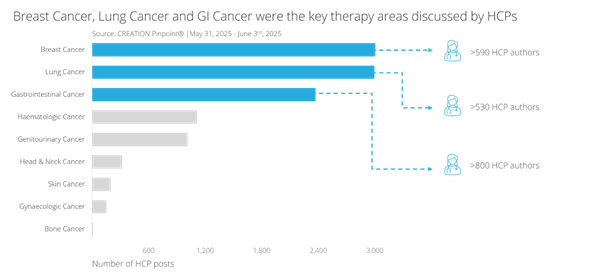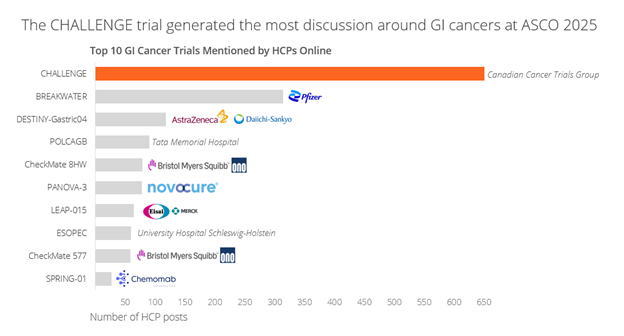ASCO 2025: Breast cancer breakthroughs drive HCPs’ online conversations

Every year at ASCO, we see new data. New combinations. New standards of care. But what’s increasingly defining the impact of those breakthroughs is not just what’s presented from the podium - but what’s said in the moments after, on social media, in real time, by healthcare professionals around the world.
Through the five days of ASCO this year, Creation listened to these conversations, tracked which trials and treatments resonated, how discussion evolved day-by-day, and, crucially, which voices HCPs trusted most. In total, HCPs authored over 29,000 posts on X (formerly Twitter), accounting for 27% of all ASCO-related social media conversations.
HCPs were active interpreters of the research and data presented - translating results into real-world relevance, interrogating evidence, and shaping the perception and impact of data - among peers and the public and well beyond the confines of the congress itself.
Breast cancer leads
This year, breast cancer was the most-discussed cancer type among HCPs online, exceeding 3,000 posts by just under 600 HCPs.

One-third of this conversation centred on the latest breast cancer trial results. Of particular focus was AstraZeneca’s SERENA-6 trial, which tested camizestrant as a treatment for certain patients with HR-positive, HER2-negative advanced breast cancer.
Online reactions to the trial’s results varied. US oncologist Lubna Chaudhary, for example, praised the results as “practice-changing”, emphasising progression-free survival data. Others, like Italian radio-oncologist Icro Meattini, adopted a more neutral tone - suggesting that, while the treatment has much potential, clinical utility must still be demonstrated. His post was shared by four HCP peers and drew over 425,000 impressions.
Elsewhere, Dr Paolo Tarantino reiterated a point that questioned whether PFS2 data should include post-camizestrant treatment. In the post, shared by four other HCPs, Tarantino warned of potential imbalances in PFS comparisons between patients.
Beyond analysing the contents of posts, ‘peer trust’ online can also be assessed; to identify the HCPs who other HCPs turn to for insights and interpretation in a certain space. Based on online interactions and mentions, often the most powerful voices in the landscape aren’t necessarily those with the most followers.
In SERENA-6 online conversation, breast oncologist Stephanie Graff emerged as the most trusted voice, mentioned 24 times by peers. In one post, Graff said that the trial “creates a lot of questions”, and took a more hesitant approach to labelling the treatment as “practice-changing”. This post was shared by 10 HCPs, and drew more than 200,000 impressions.
Other frequently mentioned trials were Pfizer and Arvinas’ VERITAC-C (190 mentions), Gilead’s ASCENT-04 (179), and Roche’s INAVO120 (177).
Lung cancer
Lung cancer proved the second-most discussed cancer type during ASCO 2025, totalling 2,995 mentions by more than 530 HCPs. As with breast cancer, clinical trial data drove much of the conversation - particularly on 2nd June. That day, two trials stood out.
First, Amgen’s DELLphi-304 trial, which tested tarlatamab in patients with small-cell lung cancer, was widely praised. Thoracic oncologist Misty Shields commended the trial’s execution and results, while Mexico-based oncologist David Heredia wrote that the data “confirms tarlatamab’s superiority over chemo” as a new second-line standard of care.
It was Hidehito Horinouchi, however, an oncologist based in Japan, who proved the top ranked HCP for peer trust in discussions related to the trial. In total, he was mentioned 126 times by HCP colleagues, and his posts sharing trial data were reposted by 22. His most-shared post drew 18 HCP reposts and 114,200 impressions.
The second trial was IMforte, which assessed lurbinectedin plus atezolizumab as a treatment for patients with ES-SCLC. It was responsible for causing the largest spike in online conversations among HCPs.
HCPs broadly welcomed the treatment as a new option for patients with the disease. Sanjay Popat, a UK-based oncologist, praised the trial for developing a “new standard of care”, a sentiment echoed by Australian radiation oncologist Shankar Siva.
The HCP judged to have the highest peer trust in conversations around IMforte was Stephen V Liu, a thoracic oncologist based in the United States. In total, Liu was mentioned 27 times, and reposted 17 times by other HCPs. His most popular post regarding IMforte drew 17 HCP reposts - and 87,160 views.
GI cancer
Interestingly, the cancer type that attracted the largest number of unique HCP contributors, totalling over 800, was gastrointestinal.
Again, clinical trials galvanised conversation. The most significant of these was the CHALLENGE trial, which, interestingly, assessed the impact of a structured exercise programme on disease-free survival in stage 3 or high-risk stage 2 colon cancer. It found that exercise after treatment cut the risk of bowel cancer returning.

The results were widely welcomed. Turkish oncologist Mustafa Ozdogan described the findings as proof that structured exercise is “not just a lifestyle - it’s life-saving.” The same sentiment was echoed by US oncologists Ishwaria Subbiah and Hagen Kennecke, the latter posting: “When patients ask us “what else can I do?”, we can confidently say - please EXERCISE!"
Excitement was partially tempered by other HCPs, however, who scrutinised the findings and execution of the trial. Electrophysiologist John Mandrola, for example, shared a link to his Substack blog, where he offered a “critical appraisal” of the trial. Elsewhere, oncologist Timothée Olivier shared an article he wrote related to the trial - expressing methodological concerns about censoring patterns.
The top ranked HCP for peer trust discussing the CHALLENGE trial, nonetheless, encouraged prescribing exercise to patients in the same way that one would prescribe adjuvant therapy. This was Amol Akhade, an oncologist based in India. He was mentioned a significant 120 times by peers, and reposted 70 times.
Polycythaemia vera
Beyond the most common cancers, we also uncovered a portion of conversation related to polycythaemia vera - a rare type of blood cancer. Takeda’s VERIFY, which evaluated rusfertide as a potential treatment option to improve quality of life, drew particular attention.
Spanish haematologist Dr Valentin Garcia, a trial co-author, called the findings a “major advance.” US-based Dr Ruben A. Mesa also praised the data, drawing more than 180,000 impressions and 7 HCP shares with a post celebrating the presenting team’s “amazing job.”
The top-ranked HCP for peer trust discussing VERIFY was Andrew Kuykendall, the US-based haematologist who presented the trial. Kuykendall was mentioned 41 times by peers in the context of VERIFY.
Why this matters
Clinical data presented at ASCO doesn’t exist in a vacuum. It’s interpreted, filtered, and often redefined by the clinicians who engage with it. Online conversations among HCP peers influence which results resonate, and which raise doubts - both of which can have implications for clinical adoption.
These insights offer a real-time lens into what excites, divides, or convinces the clinical community. They also offer a reminder that influence isn’t always about audience size or post volume - it’s about trust. While trials provide the evidence, it’s the conversation that brings the data to life.
About the author
 Daniel Ghinn is the founder and CEO of Creation Healthcare, which provides insights and consulting to inform health strategy, communications, and policymaking among global healthcare companies, government organisations, and NGOs.
Daniel Ghinn is the founder and CEO of Creation Healthcare, which provides insights and consulting to inform health strategy, communications, and policymaking among global healthcare companies, government organisations, and NGOs.












